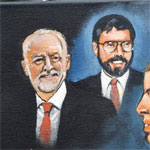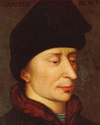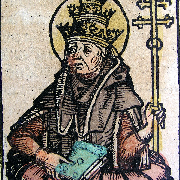|
Hm, I thought they were called Dutch because most of them boarded their ships to America in Rotterdam and the tariffs officials were interested in recording that rather than their personal details prior to the journey.
|
|
|
|

|
| # ? May 26, 2024 19:37 |
|
There were tons of other German immigrants to the US who stayed in primarily-German-speaking communities pretty much until the US entered World War I, many of whom would have happened to go through the modern Netherlands. For whatever reason though most of those didn't stay "Dutch" but rather were referred to as German even in the colonial period. I mean, often the towns/areas they moved to were referred to by English speakers as "Germantown", including the actual town of Germantown, Pennslvyania. Perhaps the real reason the "Dutch" name caught on was to try to signify their difference from the more integrated but still German speaking Germans?
|
|
|
|
Dutch Deutsch, it's literally the same thing.
|
|
|
|
fishmech posted:There were tons of other German immigrants to the US who stayed in primarily-German-speaking communities pretty much until the US entered World War I, many of whom would have happened to go through the modern Netherlands. For whatever reason though most of those didn't stay "Dutch" but rather were referred to as German even in the colonial period. The Pennsylvania Dutch in particular were the product of the 30 year war. They came from the decimated, economically crippled areas around the Rhine and, throughout the decades following the war, migrated to Pennsylvania, in part inspired by the propaganda contained in the "Queen Anne Golden Book" that was distributed by colonial agents throughout the Rhineland. They then travelled up the river to the one port capable of catering to them, and boarded their ships in Rotterdam. d The German identities that immigrated to America in the later centuries / decades don't really matter in the story of the Pennsylvania Dutch first because they happened after the term "Pennsylvania Dutch" had been coined, second because of the pattern of German immigration - they didn't settle in the originally German areas, their settlement areas drifted gradually to the west because German settlers had a tradition of making livelihood by getting a land grant, turning the barren land into a profitable homestead, selling it, and moving to the new frontier.
|
|
|
|
Kurtofan posted:Dutch Deutsch, it's literally the same thing. Don't compare noble Germans to the Dutch swamp creatures.
|
|
|
|
Is that why they call them Low Germans?
|
|
|
|
Not really Low German is mainly spoken in Northern Germany.
|
|
|
|
steinrokkan posted:Don't compare noble Germans to the Dutch swamp creatures.
|
|
|
|
When the tide goes out of an estuary it leaves a residue, and that's how The Netherlands came to be.
|
|
|
|
Baka-nin posted:Not really Low German is mainly spoken in Northern Germany.
|
|
|
|
The Dutch are degenerate dope smoking swamp Germans. Danes are field Germans.
|
|
|
|
Speaking of ze Germans, anyone remember the obsession of 19th Century German nationalism, the Empire of seventy millions? Surprisingly the only map of it I could find comes from deviant art, and it represents the artists own wish fulfilment rather than one of the actual proposals, but it gets the point across. They also translated the German into English, quote:Text on the right:
|
|
|
|
There were plenty of people hoping that this would someday come to pass throughout the 19th century, the definition of Austria being distinct from Germany is a relatively young one after all. But they were ignoring that a) a German Empire like this would have been a European juggernaut of staggering proportions, there was no way the other powers would let that have happened, and b) by 1850 the fierce rivalry between Austria and Prussia had been going on for well over a century, and next to being political the conflict was also cultural and religious in nature. There was no way in hell any one of them would have accepted the superiority of the other. Also the 1848 parliament offered the crown to the Prussian king. He refused though, on the grounds that he'd never accept a monarchy out of the hands of the common people. The fact that Austria would have raised a major stink if he had might have played into it as well.
|
|
|
|
Guavanaut posted:Is that why they call them Low Germans? Yes, High/Low German retains the Upper/Lower elevation distinction the Romans liked to use for some reason.
|
|
|
|
Arglebargle III posted:Yes, High/Low German retains the Upper/Lower elevation distinction the Romans liked to use for some reason. That reason is because the dialect regions really do map well to elevation! Not perfectly of course.
|
|
|
|
Ratpick posted:Oh, and of course there's a map about it: Huh. It's interesting that a lot of slavic countries seemed to keep a name for Germany based on 'nemets,' while Russia itself switched to Germanija despite keeping the adjective and noun nemetski and nemets for "German." I wonder when and why they switched.
|
|
|
|
fishmech posted:That reason is because the dialect regions really do map well to elevation! Not perfectly of course. I meant I do not know why the Romans preferred to name places in that way.
|
|
|
|
Arglebargle III posted:I meant I do not know why the Romans preferred to name places in that way. Maybe I'm just confused, but are you really surprised that the most straightforward way to distinguish between the higher altitudes and lower altitudes of the same general area was used?
|
|
|
|
Baka-nin posted:Speaking of ze Germans, anyone remember the obsession of 19th Century German nationalism, the Empire of seventy millions? I see they were more concerned about ARE CLAY than making an actual nation state, otherwise their ideal German Empire wouldn't have included thousands of unwashed Slavs and Uralics. Speaking of the Germanic languages, I only recently learned that German and Dutch are on completely different branches of West Germanic languages. I had always been under the impression that the two languages were essentially on the same dialect continuum owing to superficial similarities (much in the same way as Swedish and Danish were once on the same dialect continuum but have since diverged to become similar but distinct languages). It was truly eye-opening to find out that Dutch is a descendant of Low Franconian, which while still a West Germanic language isn't even on the same branch as High German.
|
|
|
|
fishmech posted:Maybe I'm just confused, but are you really surprised that the most straightforward way to distinguish between the higher altitudes and lower altitudes of the same general area was used? Can we not do the thing where you pick fights over incredibly trivial things and then pursue them long after anyone is interested?
|
|
|
|
The best alt-history scenario for Central Europe is Germany uniting under the Austro-Hungarian state then Franz Ferdinand surviving and somehow creating the United States of Greater Austria. Best for Central Europe, I bet it's a terrible world for a lot of others for some reason.
|
|
|
|
So, a reformed Holy Roman Empire.
|
|
|
|
Byzantine posted:So, a reformed Holy Roman Empire. I was describing something I thought was "better" in the sense of "fewer people would have died in this alternate 20th century than the real one", but you've managed to make me feel gross.
|
|
|
|
FreudianSlippers posted:The Dutch are degenerate dope smoking swamp Germans. Baka-nin posted:Speaking of ze Germans, anyone remember the obsession of 19th Century German nationalism, the Empire of seventy millions?
|
|
|
|
Ratpick posted:Speaking of the Germanic languages, I only recently learned that German and Dutch are on completely different branches of West Germanic languages. I had always been under the impression that the two languages were essentially on the same dialect continuum owing to superficial similarities (much in the same way as Swedish and Danish were once on the same dialect continuum but have since diverged to become similar but distinct languages). It was truly eye-opening to find out that Dutch is a descendant of Low Franconian, which while still a West Germanic language isn't even on the same branch as High German. They are on the same dialect continuum. I'm not a linguist but the Ingvaeonic/Istvaeonic/Imrionic thing greatly overstates the differences between the categories. Frisian is arguably its own thing, but Dutch and Standard German (which is essentially the dialect of Saxony, the orange part of the map labeled Thüringisch and Sächsisch, with a few southern features) are absolutely part of the same continuum group. Each border on this map corresponds for the most part to only one change in the language, and the map shows what the isoglosses are  Here is the classification I think you're referring to:  The three-class division does not correspond well to actual differences in intelligibility, for example southern/Swiss/Bavarian dialects are as distant or more from Standard German, as Low German is, yet they're counted as closer. Duch and German are more different than Swedish and Danish probably (I don't know those languages) but Spanish and Portugese is a very close comparison icantfindaname fucked around with this message at 07:50 on Aug 4, 2016 |
|
|
|
GBS presents: the epic 'swamp German' meme Ratpick posted:Speaking of the Germanic languages, I only recently learned that German and Dutch are on completely different branches of West Germanic languages. I had always been under the impression that the two languages were essentially on the same dialect continuum owing to superficial similarities (much in the same way as Swedish and Danish were once on the same dialect continuum but have since diverged to become similar but distinct languages). It was truly eye-opening to find out that Dutch is a descendant of Low Franconian, which while still a West Germanic language isn't even on the same branch as High German. Dutch is indeed more closely related to the Low German dialects than to standard [High] German. Due to the various vowel and consonant shifts that the latter has undergone, on a superficial level (obviously not in terms of the actual family tree) the Scandinavian languages often seem more instinctively familiar to me as a Dutch speaker. For example, the prevalence of 'k' which has largely shifted into 'ch' in German. e: that map makes me wonder, does a dialect continuum exist between Danish and German? I'm assuming not to the same extent since the North and West Germanic languages branched off quite some time ago and it seems to have been unambiguous during the Schleswig-Holstein referendums. Phlegmish fucked around with this message at 07:24 on Aug 4, 2016 |
|
|
|
cheerfullydrab posted:I was describing something I thought was "better" in the sense of "fewer people would have died in this alternate 20th century than the real one", but you've managed to make me feel gross. Germany uniting under the Hapsburgs probably would have led to Hungary breaking free entirely and god help you if you're a Romanian or Slavic minority in such a state. Austrian Poland and Ukraine probably would have ended up with Russia, so bad news for them too. You might save the Ottoman Empire in Europe though, and change all the Turkish ethnic cleansing into Hunarian. Really the problem with this theory is that you're sinply deleting a major power (Prussia) and things don't really work like that. Germany was never going to united under the Hapsburgs because Prussia existed. You would not have gotten a neo-feudal federalist wonderland stretching from the Dutch border to Transylvania no matter what you did post 1815 because feudalism was dead post 1815 Phlegmish posted:e: that map makes me wonder, does a dialect continuum exist between Danish and German? I'm assuming not to the same extent since the North and West Germanic languages branched off quite some time ago and it seems to have been unambiguous during the Schleswig-Holstein referendums. Not really, no. The Holstein dialect of Low German has some features in common with Danish but there's a pretty severe break, and those features are from two separate languages being adjacent for a long time instead of from common descent. Dutch/German and Scandanavian aren't really mutually intelligible to any extent icantfindaname fucked around with this message at 07:42 on Aug 4, 2016 |
|
|
|
Arglebargle III posted:I meant I do not know why the Romans preferred to name places in that way. The Roman upper/lower referred to rivers. Lower was downstream, upper was upstream. Same thing as upper/lower Egypt..
|
|
|
|
Phlegmish posted:e: that map makes me wonder, does a dialect continuum exist between Danish and German? I'm assuming not to the same extent since the North and West Germanic languages branched off quite some time ago and it seems to have been unambiguous during the Schleswig-Holstein referendums. icantfindaname posted:Not really, no. The Holstein dialect of Low German has some features in common with Danish but there's a pretty severe break, and those features are from two separate languages being adjacent for a long time instead of from common descent That said, after Schleswig-Holstein was nabbed by Prussia, their policy of Germanization probably did a lot to break down the identity-continuum, by making the most-Danish minded people leave while Germans from the south continued to move in, and it certainly shifted the balance of it.
|
|
|
|
Baka-nin posted:Speaking of ze Germans, anyone remember the obsession of 19th Century German nationalism, the Empire of seventy millions? AFAIK the Grossdeutsche Loösung (the concept of broad German unification proposed before 1848) would have covered the German Confederation + Prussia. It wouldn't have included Hungary, Venice, or Austrian Adriatics (which is why the Habsburgs were opposed to it). 
|
|
|
|
duckmaster posted:Public transport on Sundays in the UK is 'limited' (to say the least) - do the Sunday voting countries put on similar levels of public transport on election days as they would on weekdays, or is the UK unique in having limited transport services on Sunday? Or is public transport in the Sunday voting countries as atrocious as it is here? In Switzerland, every person who is allowed to vote receives the relevant materials (the actual ballot plus a small booklet containing some information on the subject of the current election/vote) per post about a month in advance. Afterwards, you can just fill out the ballot and mail it back free of charge at your own convenience. The only people who actually bother to show up at polling stations on election day are those who enjoy the theatrics or the company.
|
|
|
|
I think I'd be one of those people showing up to vote in person, it somehow doesn't feel right to vote by mail unless you're obligated to.
|
|
|
|
A Buttery Pastry posted:Christ people, a swamp is a wetland with trees. The Dutch clearly aren't swamp Germans. Fine "Bog Krauts" if you want to get all politically correct.
|
|
|
|
Baka-nin posted:Not really Low German is mainly spoken in Northern Germany. My old Mennonite relatives told me that more people speak Low German in Canada than in Germany. According to Wikipedia they were wrong, but they might have been insinuating that Mennonites speak true Low German while the heathens in Germany speak some gibberish that's been infected with Papism and alcohol and dancing. For content, here's a map of Mennonites. Each dot represents a Mennonite church in that country. Politically loaded for Mennonites because it's not in Plautdietsch. 
|
|
|
|
Chicken posted:My old Mennonite relatives told me that more people speak Low German in Canada than in Germany. According to Wikipedia they were wrong, but they might have been insinuating that Mennonites speak true Low German while the heathens in Germany speak some gibberish that's been infected with Papism and alcohol and dancing. Woah. I had no idea Mennonism was so popular in Africa. (I don't think "Mennonism" is the correct word but google isn't giving me any alternatives)
|
|
|
|
You've got to keep in mind that each dot is a single church. I'm not sure how big Mennonite churches are in Africa but even if they have 500 people each, that's fewer than 300,000 Mennonites in a continent with a billion people. And I think Mennoism may be technically correct, but most people would just use "the Mennonite Church". Or "true believers".
|
|
|
|
Chicken posted:My old Mennonite relatives told me that more people speak Low German in Canada than in Germany. According to Wikipedia they were wrong, but they might have been insinuating that Mennonites speak true Low German while the heathens in Germany speak some gibberish that's been infected with Papism and alcohol and dancing. What they presumably mean is that the Low German dialects have declined in favor of the standard language, albeit still with a strong regional accent if it follows the same pattern as in Flanders with standard Dutch. Which I assume is the case, System Metternich might be able to confirm. It's interesting, because in some areas of Northern Germany (and Groningen in the Netherlands) Low German/Niedersaksisch had itself supplanted the original Frisian dialects. As far as I'm aware, most people in that area of Germany have a Lutheran background, though I suppose your relatives would consider that to be Papism-light. Phlegmish fucked around with this message at 07:19 on Aug 5, 2016 |
|
|
|
FreudianSlippers posted:Fine "Bog Krauts" if you want to get all politically correct. Moorfranken.
|
|
|
|
Phlegmish posted:What they presumably mean is that the Low German dialects have declined in favor of the standard language, albeit still with a strong regional accent if it follows the same pattern as in Flanders with standard Dutch. Which I assume is the case, System Metternich might be able to confirm. It's interesting, because in some areas of Northern Germany (and Groningen in the Netherlands) Low German/Niedersaksisch had itself supplanted the original Frisian dialects. Yep, with the exception of some areas in north-western Germany which used to belong to the prince-archbishopric of Münster the entire North is solidly Lutheran (or nothing, as far as the area of the former GDR is concerned). Interestingly there is hardly any regional accent in Northern Germany anymore, people either speak Low German or something that's very close to how Standard German is written. In some areas (especially those close to the coastline) you can still hear people speaking in an accent that's imemdiately identifiable as "northern German" to me, mostly not because of any difference in vocabulary but due to how it all sounds, it's hard to describe. Here's a video of some creep recording the conversations of his neighbours, and they're speaking perfectly fine Standard German, only with a slight "twang", so to speak. Low German actually had a hard time compared to Middle/Upper German from the 16th century onwards, as the local elites mostly decided to not use it in writing, so it never really had the chance to establish itself as a language of literature or education. It did continue to get spoken even in the higher echelons of society (Thomas Mann has the well-off merchant family from Lübeck occasionally speak in Low German in his Buddenbrooks), but the fact that written German is way closer to today's Upper German dialects than to Low German has led to the majority gradually abandoning it, and today it's in most areas only spoken by the elderly, mostly in a rural context but sometimes also by old workers (especially those who used to work in the harbour) in the cities. Basically in northern Germany, it's (with a few exceptions) either Standard German, sometimes with an audible northern accent, or this: https://www.youtube.com/watch?v=utgx1e2RpIM whereas in the south you've got a much broader continuum with everything from full basilect to Standard German and inbetween
|
|
|
|

|
| # ? May 26, 2024 19:37 |
|
Low German could have just as easily been assimilated into Dutch, really. I suspect the linguistic distance between Low German and High German is about the same as the distance between Low German and Dutch.
|
|
|



































